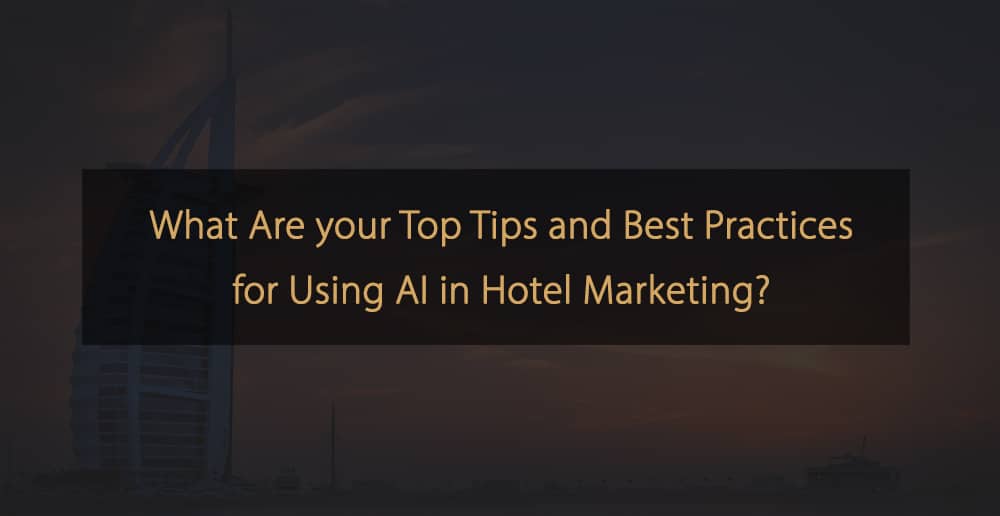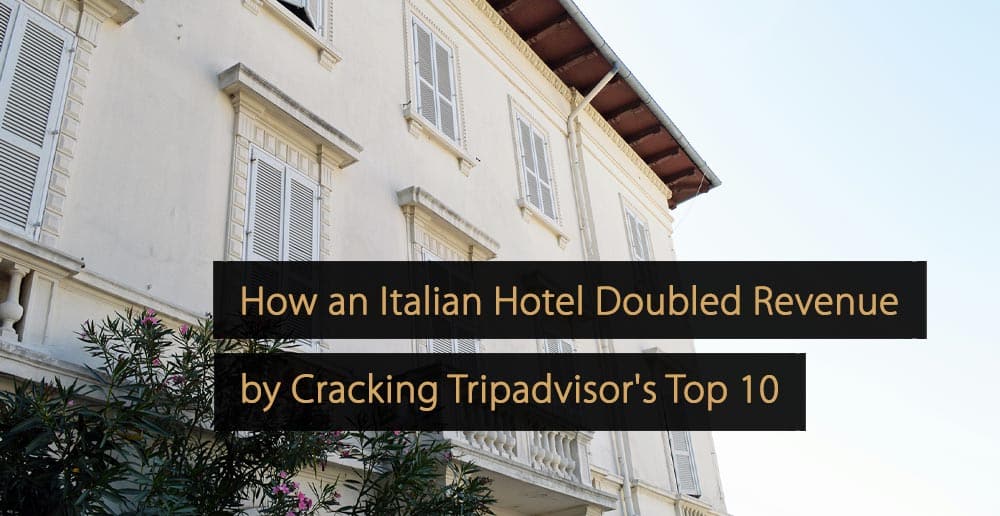Question for Our Revenue Management Expert Panel:
What are the advantages of participating in special OTA deals? What advice can you offer to maximise your ROI? Are there any pitfalls to avoid? (Question by Chaya Kowal)
Industry Expert Panel
Our Industry Expert Panel exists out of professionals within the hospitality & travel Industry. They have comprehensive and detailed knowledge, experience in practice or management and are forward-thinking. They are answering questions about the state of the industry. They share their insights on topics like revenue management, marketing, operations, technology and discuss the latest trends.
Our Revenue Management Expert Panel
- Connor Vanderholm – CEO, Topline
- Alenka McMahon – Managing Director, Hotel Revenue Services Limited
- Diego Fernández Pérez De Ponga – Director of Revenue Management, Palladium Hotel Group
- Krunal Shah – Director of Revenue Management, The Biltmore Mayfair, LXR Hotels & Resorts
- Tanya Hadwick – Group Revenue & Yield Leader, SunSwept Resorts
- Massimiliano Terzulli – Revenue Management Consultant, Franco Grasso Revenue Team
- Heiko Rieder – Vice President Business Development, Hirmer Hospitality and Travel Charme Hotels
- Damiano Zennaro – Founder, DZ Consulting
- Fabian Bartnick – Founder, Infinito
- Mariska Van Heemskerk – Owner, Revenue Management Works
- Ask Our Panel a Question
- Join Our Expert Panel
“In the US we have seen a significant increase in OTA traffic in many markets as the price of accommodations has risen sharply. OTA promos can help hotels tap into demand pockets when they need to fill. As with any discounting, OTA promos should be targeted at both the traveller demographic and time frame, rather than casting a wide net. Independent hotels can take advantage of this with less friction than branded hotels which often have parity agreements and fees attached to them. Independent hotels do not pay brand franchise fees so OTA commissions can often be easier to swallow.”
“The big advantage is visibility. Participating with OTA deals must be controlled and carefully chosen by geography, customer mix, etc., and what hotels can really offer. Some deals can be tailored for example only for specific room categories and specific times. One of the bigger pitfalls is multi-mix deals which can create damage to ADR.”
“Participating in special deals with Online Travel Agencies (OTAs) offers advantages for hotels. Firstly, it provides increased visibility and exposure to a wide customer base, leading to more bookings and revenue. Secondly, OTAs can help hotels fill empty rooms during low-demand periods, ensuring optimal occupancy levels.
A successful example of participating in OTA deals is when a hotel collaborates with a popular OTA to offer exclusive promotions or discounted rates for a limited time. This attracts price-sensitive travellers and increases bookings and potential repeat customers.”
“Hotels generally look for target audiences. This can sometimes be achieved by participating in special OTA deals which can be specific to a certain market. It also helps in generating low-season bookings and increasing visibility to travellers worldwide. It is also an incremental revenue which is technically not forecasted for. Travel ads are the best examples of achieving the maximum ROI. “
“I think it really depends on your market and customer base. By not participating in the deal, your visibility can often be impacted and if you are heavily reliant on the billboard effect of OTAs then it’s probably a good idea to participate. These should be used effectively and efficiently when you have the need and requirement only, not as a blanket must participate. Experiment, analyse the data before, during and after, and walk away if it fails.”
“I try to avoid special OTA promotions as much as possible, as often they are offers that OTAs propose to force you to lower the price and be more competitive than other OTAs. To avoid disparities, you are forced to replicate those offers on other OTAs, and the more channels you have, the longer and more complicated the process of managing discounts becomes, with the risk of losing control over price parity on the one hand and losing the perception of what the real market rate is on the other.
In fact, when these offers are applied, doubt always arises. Do they work because the promotion itself works or because the price is lower? Would the same number of bookings have arrived without the promotion? If the starting price had been much higher and out of the market, would the promotion have worked anyway? Sometimes it is difficult to have counter-evidence, and in general, there are more disadvantages than benefits.
However, I always prefer personalised promotions, where there is a margin to decide the sales conditions, rather than promotions pre-configured by OTAs. With personalised promotions you have the possibility to decide on which dates to apply the promotion (which dates to exclude), the sales restrictions, the countries to target, etc. I find more benefits and results in personalised promotions, such as discounts on long stays or offers for certain countries/regions.”
“Participating in special OTA (Online Travel Agency) deals and promotions can have both pros and cons for hotels.
Pros:
- Increased Visibility: OTA platforms have a large user base and can provide exposure to a broader audience, increasing the hotel’s visibility and potential bookings
- Fill Occupancy Gaps: Hotels can use OTAs to fill unoccupied rooms during low-demand periods or last-minute vacancies.
- Customer Acquisition: OTAs can help hotels acquire new customers who may not have discovered the hotel through other channels.
- Simplified Booking Process: OTAs provide a convenient and user-friendly booking process for guests, potentially leading to more bookings.
Cons:
- Commissions: OTAs typically charge hotels a commission, which can range from 15% to 25% or even more per booking. This can significantly impact a hotel’s profitability.
- Reduced Control: Hotels may have limited control over their branding and customer relationships when bookings are made through OTAs, as guests primarily interact with the OTA platform.
- Rate Parity: OTAs often require rate parity, meaning that the hotel must offer the same or lower prices on the OTA as on their own website. This can restrict a hotel’s ability to offer exclusive deals to direct bookers. It includes the risk of losing direct customers to OTAs.
- Customer Data Access: Hotels may have limited access to guest data and preferences when bookings are made through OTAs, making it harder to build direct relationships with customers.
- Cannibalization: Overreliance on OTAs can lead to a situation where a significant portion of bookings comes through these platforms, potentially reducing direct bookings and profitability.
- Promotional Costs: Participating in OTA promotions or deals can involve additional costs for hotels, impacting their margins.
- Less Personalisation: OTAs often offer a standard booking process, which may not allow for the same level of personalization and customization that a hotel’s own website can provide. Customers sometimes don’t realize that they book on a 3rd party booking engine.
In summary, while OTAs can be a valuable distribution channel for hotels, they come with trade-offs. Hotels must carefully consider their distribution strategy, weigh the pros and cons, and find a balance between using OTAs and driving direct bookings to maximise their revenue and profitability. Good participations are those where no other business (especially from regular clients who usually book direct) is displaced and that it supports the profitability from rooms and ancillary revenues during low seasons. Even better if it also supports the acquisition of future bookers through in-property initiatives to motivate OTA clients to return and book direct in future.”
“Before participating in any special deals, it’s important to reflect and ask yourself… Is it necessary? What do I want to achieve? Are there any other ways to stimulate demand? Am I undermining my direct channel? If all your answers are pointing in a direction, it is always worth trying. However, if you do so, make sure you closely monitor results and ROI. keeping in mind your cost of distribution and acquisition.”
“The advantages are that you are getting more revenue, badges and banners. We have seen great success. However, many hotels have been hooked on them or even worse, increase their rates before the sale to then give more discount – only to have the same rate as before… and then wonder why nothing happened!
This is silly and in many cases against Advertising standards in many countries. The key things you need to decide on are:
- Do I need the deal?
- How many rooms do I want to allocate?
- Is it outside my lead time?
Not every deal is created equal. The pitfall is that all your bookings come in via sale and that is it.”
“First and foremost it is important that you at least have parity with your own website. Is it possible to run the promotion via your own channels as well? Run a displacement based on your forecast to see what need there is for promotions to avoid dilution of your regular pick-up/demand. Make sure you calculate worst / best-case scenarios and keep the option open to close out certain days. What is the regular lead time for a certain period of time, are you already in it, or are you missing business, do you really need a promotion? Make sure you have those questions answered before running any kind of promotion.”
Ask a Question & Join Our Expert Panel
Would you like a question to be answered by our Industry Expert Panel? Or would you like to join our community of experts and share your experience, insights, and knowledge with fellow industry professionals? Via the buttons below you can submit a question or submit a request to become part of our expert panel.
More Tips to Grow Your Business
Revfine.com is the leading knowledge platform for the hospitality and travel industry. Professionals use our insights, strategies, and actionable tips to get inspired, optimize revenue, innovate processes, and improve customer experience.Explore expert advice on management, marketing, revenue management, operations, software, and technology in our dedicated Hotel, Hospitality, and Travel & Tourism categories.

















Leave A Comment